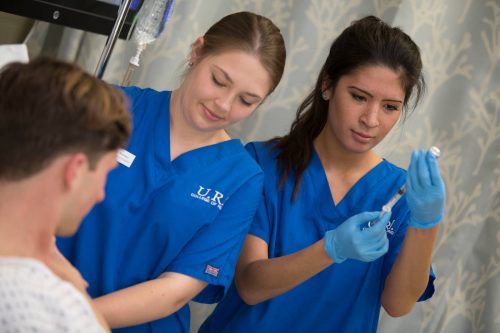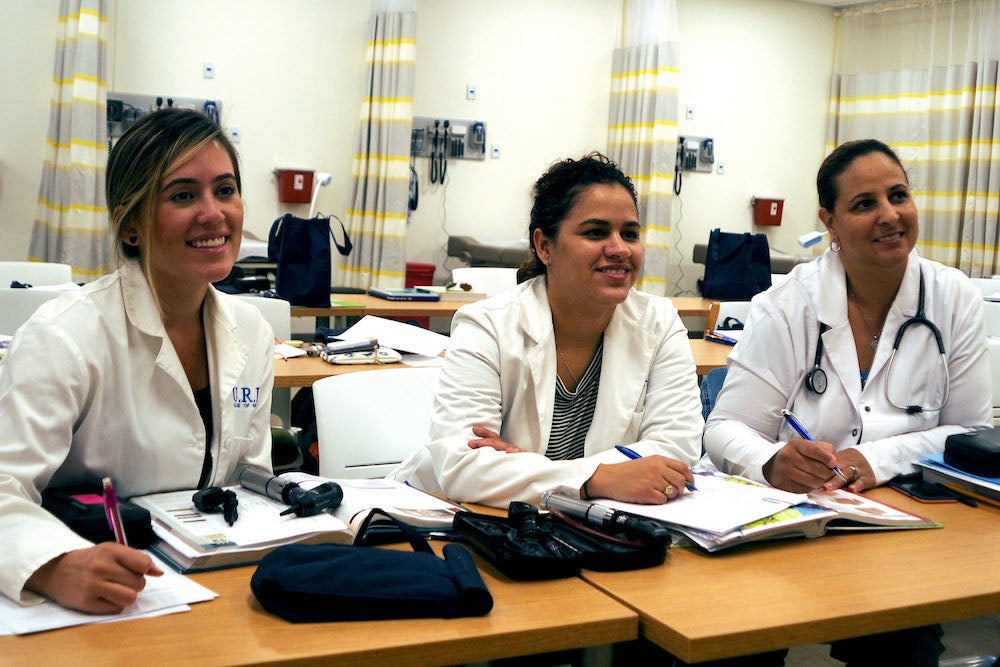Overview

URI’s baccalaureate nursing program is designed to prepare students academically and personally to become professional nurses. It aims to develop knowledgeable, compassionate, and insightful graduates who are poised to become leaders in healthcare delivery. As future clinicians and scholars, the URI Baccalaureate nursing student will be vested in foundational theory and contemporary practice while being given the opportunity for clinical experiences with individuals, families, and communities, across populations, both locally and globally.
Nursing is the largest discipline in healthcare delivery and our program prepares students for collaborative, interdisciplinary, practice. Working with faculty who are expert clinicians, scholars, and innovators, students will be challenged to have a deep appreciation of factors that impact patient wellbeing and forward creative, contemporary approaches in patient-centered care.
Upon graduation, students are eligible to take the National Council of State Boards of Nursing Licensure Examination (NCLEX-RN) which is required for licensure as a Registered Nurse.
Bachelor of Science Degree Program Outcomes
- Knowledge for Nursing Practice: Integrate and apply nursing knowledge supported by knowledge from liberal arts and sciences to enrich nursing practice
- Person-Centered Care: Implement holistic, just, compassionate, person-centered, evidence-based nursing care to individuals and families across the lifespan and spheres of care.
- Population Health: Use principles of social justice, advocacy, and collaboration to promote equitable care for individuals, families, communities, and populations, from prevention to disease management, through partnerships that address social determinants of health and improve population health outcomes.
- Scholarship for the Nursing Discipline: Engage in scholarly inquiry and critically appraise research as the foundation to deliver evidence-based nursing practice.
- Quality and Safety: Use principles of quality and safety as core values of nursing to enhance practice and minimize risk of harm to patients and providers.
- Interprofessional Partnerships: Engage with individuals, families, communities, health care professionals, and other colleagues to optimize care, enhance the healthcare experience, and improve outcomes.
- Systems-Based Practice: Coordinate and utilize resources in healthcare settings to provide safe, quality, equitable, and value- based care to diverse populations.
- Informatics and Healthcare Technologies: Use healthcare technology to gather and interpret data, form information to support clinical judgment, provide care, and improve interprofessional communication that enhances healthcare delivery in accordance with best practice and professional and regulatory standards.
- Professionalism: Cultivate a professional identity and conduct grounded in nursing core values of compassionate caring, a collaborative disposition, civility, accountability, ethics and social justice for exemplary practice.
- Personal, Professional, and Leadership Development: Engage in wellness by participating in activities and self-reflection that fosters personal health, resilience, and well- being; contributes to lifelong learning; and supports the acquisition of nursing expertise and leadership.
Admission
All new students should refer to the University of Rhode Island admission website for specific admission requirements. Currently, transfer students are not admissible to the pre-licensure nursing program. If you attended the University of Rhode Island as a degree seeking student in the past you must apply for readmission.
Readmission Requirements:
Readmission is currently suspended.
Readmission applications are reviewed by the Scholastic Standing Committee (SSC) . The SSC looks for strength in the sciences and a grade point average over 3.0. Applicants must complete the following courses with a ‘C’ or better: Writing (WRT 104 or 106), Introductory Chemistry (CHM 103), Introduction to Organic Chemistry (CHM 124), Fundamentals of Human Anatomy and Physiology I, II, Lab I and II( BIO 220, BIO 221, BIO 222, BIO 223). Admission is not guaranteed even if pre-requisites are met. To apply for readmission, please click here – Readmission Form
Licensure Statement:
In accordance with the 2019 Reauthorization of the Higher Education Act, URI hereby discloses only that the curriculum for this program meets the educational requirements for licensure as a Registered Nurse in the State of Rhode Island. The applicable licensing board in Rhode Island may impose additional requirements on candidates prior to granting a license, we encourage you to investigate those requirements. URI has not determined whether the curriculum for this program meets the educational requirements for licensure in any other states or territories and we encourage you to investigate the requirements in your state or territory prior to accepting an offer of admission at URI.
Please contact nurse@uri.edu for more information.
Curriculum

The Bachelor of Science in Nursing requires 120 credits for graduation consisting of program specific courses, as well as, general education requirements. The program is designed to be completed in four years, and courses must be completed in the appropriate sequence. The curriculum provides students with the opportunity to work with expert nursing faculty and to explore the health needs of diverse populations.
The clinical courses include experiences in numerous hospitals, community health agencies, nursing homes, schools and clinics throughout Rhode Island. From the very first clinical experience to the final semester, students will gain the competence and confidence needed to practice nursing in a constantly changing health-care arena.
Graduates are prepared to begin their careers in a number of practice areas, including but not limited to medical-surgical, gerontology, maternity, pediatric, psychiatric-mental health, or community health nursing.
Curriculum Sheets
| 2025-2026 |
| Fall 2024 |
| Fall 2023 - 4 year plan |
| Fall 2023 - 4 1/2 year Plan |
| Fall 2019 - Spring 2023 4 year plan |
| Fall 2019 - Spring 2023 4 ½ year plan |
Required Non-Nursing Courses |
||
| BIO 220* | Fundamentals of Human Anatomy & Physiology I | 3 cr |
| BIO 221* | Fundamentals of Human Anatomy & Physiology Laboratory | 1 cr |
| BIO 222* | Fundamentals of Human Anatomy & Physiology II | 3 cr |
| BIO 223* | Fundamentals of Human Anatomy & Physiology II Laboratory | 1 cr |
| CHM 103* | Introductory Chemistry (A1) | 3 cr |
| CHM 124* | Introduction to Organic Chemistry | 3 cr |
| CMB 201 | Introduction to Medical Microbiology | 4 cr |
| NUT 207 | General Nutrition (B3, A1) | 3 cr |
| STA 220 | Statistics in Modern Society (B3) | 3 cr |
| URI 101 | Planning for Academic Success | 1 cr |
| WRT 104/106* | Writing to Inform and Explain | Research Writing (B1,B4) | 3 cr |
Required Nursing Courses |
||
| NUR 100* | Foundations of Professional Practice | 3 cr |
| NUR 203 | Comprehensive Health Assessment | 3 cr |
| NUR 213 | Pathophysiology | 3 cr |
| NUR 208 | Growth, Development and Health Promotion Across the Lifespan | 3 cr |
| NUR 233 | Introduction to Care of Adults and Older Adults | 3 cr |
| NUR 234 | Practicum: Care of Adults and Older Adults | 3 cr |
| NUR 243 | Pharmacotherapeutics for Nursing | 3 cr |
| NUR 253 | Nursing Research | 3 cr |
| NUR 313 | Acute Care of Adults and Older Adults | 3 cr |
| NUR 314 | Practicum: Clients with Acute and Chronic Illnesses | 3 cr |
| NUR 333 | Psychiatric Mental Health Nursing | 3 cr |
| NUR 334 | Practicum: Psychiatric Mental Health Nursing | 3 cr |
| NUR 353 | Family Health Nursing | 4 cr |
| NUR 354 | Practicum: Family Health Nursing | 3 cr |
| NUR 412 | Health Care Economics, Policy and Ethics | 3 cr |
| NUR 443 | Community/Public Health Nursing | 3 cr |
| NUR 444 | Practicum: Community/Public Health Nursing | 3 cr |
| NUR 413 | Complex Care of Adults and Older Adults | 3 cr |
| NUR 415 | Transition to Professional Nursing Practices | 3 cr |
| NUR 417 | Clinical Immersion | 6 cr |
| Total Nursing Credits | 64 | |


